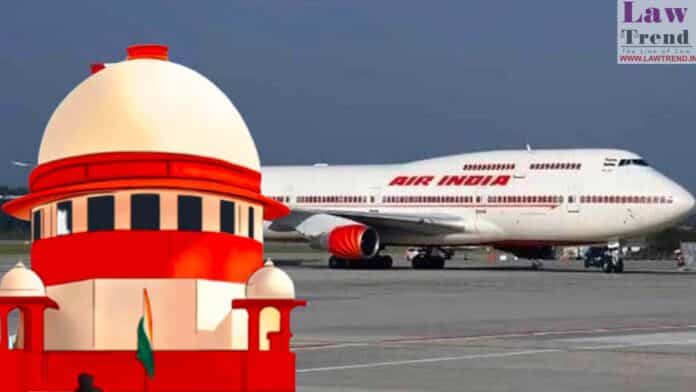The Supreme Court on Friday declined to entertain a public interest litigation (PIL) seeking an independent audit of Air India’s safety protocols in the wake of the June 12 crash of flight AI 171 in Ahmedabad, cautioning that one tragic incident should not be used to target a single airline.
A bench comprising Justice Surya Kant and Justice Joymalya Bagchi observed that aviation safety is a sector-wide issue and should not be reduced to scrutiny of one operator. “One unfortunate event cannot mean you go after just one airline,” the bench remarked during the hearing. “Why only Air India? Should there not be such a mechanism for all airlines? There was a very unfortunate tragedy but that should not become an opportunity to run down the airline. We also travel very frequently.”
PIL Sought International Audit of Air India
The PIL, filed by advocate Narendra Kumar Goswami, urged the court to direct a comprehensive safety and maintenance audit of Air India’s entire fleet by an international agency accredited by the International Civil Aviation Organization (ICAO), under the supervision of a retired Supreme Court judge. It also sought a direction to the Directorate General of Civil Aviation (DGCA) to implement a robust mechanism to oversee the airline’s operational safety.
The petition was filed in response to the June 12 crash of Air India’s flight AI 171, a Gatwick-bound Boeing 787 Dreamliner that went down shortly after take-off from Ahmedabad, killing 241 of the 242 people on board and 19 more on the ground. Among the victims were 181 Indian and 52 British nationals. The tragedy occurred while Air India, now under Tata Group ownership, was undergoing a large-scale operational revamp.
Court Questions Narrow Scope
The court took issue with the limited focus of the petition, stating that any serious proposal for improving air safety must encompass all airlines operating in Indian airspace. “If you want a regulatory mechanism, you must implead all airlines, including foreign airlines,” the bench said. It also advised the petitioner to approach the concerned authorities first, stating, “You should first go to the authorities concerned with persuasive suggestions and we are certain they will pay heed.”
When Goswami cited a personal grievance with Air India, the court pointed out that such matters could be addressed through consumer protection mechanisms, not a PIL. The judges further expressed concern about the intent behind the petition. “If you are going to pick on just one airline, it may also give an impression that you have been set up by a competitor,” the bench observed.
Eventually, the petitioner withdrew the PIL, and the court recorded in its order: “The petitioner seeks to withdraw the petition to avail of appropriate remedies before appropriate authorities first.”
Crash Investigation and Aftermath
The Aircraft Accident Investigation Bureau of India is leading the inquiry into the AI 171 crash, with cooperation from the US National Transportation Safety Board, the UK’s Air Accidents Investigation Branch, and Boeing.
According to a preliminary report by the DGCA, both engine fuel control switches had moved from RUN to CUTOFF seconds after takeoff, causing immediate loss of thrust. One pilot was recorded asking why the switches had been turned off, while the other denied doing it. The aircraft’s Ram Air Turbine deployed automatically, and although one engine recovered after the switches were restored to RUN, the plane failed to regain altitude. A Mayday call was made moments before the crash.
In the aftermath, the Tata Group announced an ex gratia payment of ₹1 crore to the families of each deceased passenger and ₹25 lakh to the families of those killed on the ground. Additionally, the conglomerate has set up the AI-171 Memorial and Welfare Trust with a corpus of ₹500 crore—₹250 crore each from Tata Sons and Tata Trusts—to provide long-term support to the affected families.




